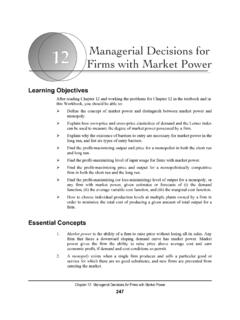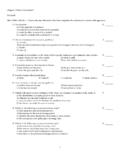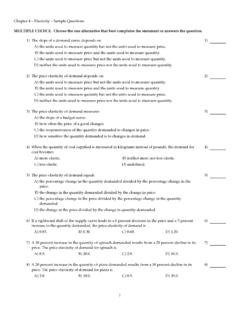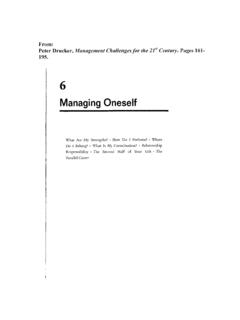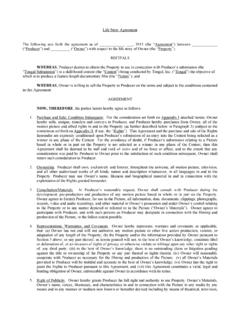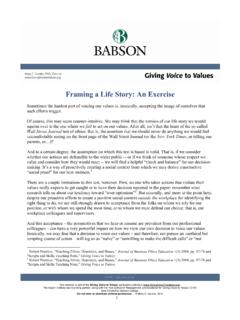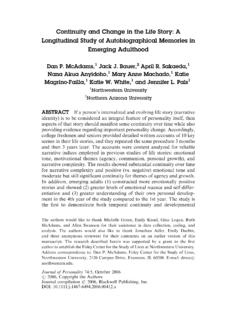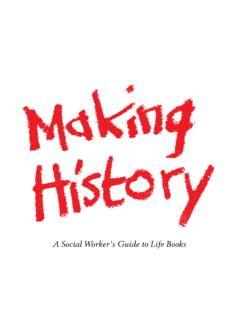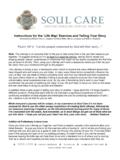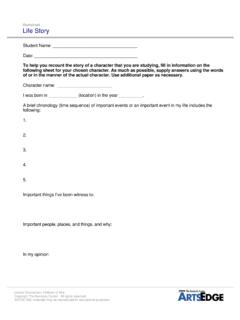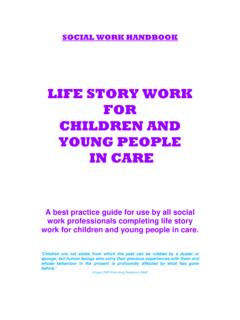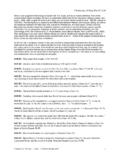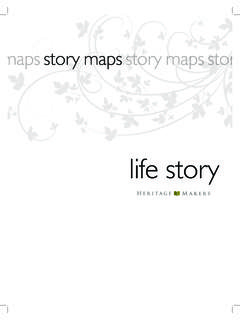Transcription of Life Story Interview Project Overview Choosing a person to ...
1 1 life Story Interview Project PSY 353 Adult Development & Aging Prof. Jack Bauer University of Dayton Overview Interview an adult about his/her perceptions of his/her own development Write a well-organized paper that presents his or her Story of development (4-5 pages) Choosing a person to Interview person must be at least 30 years old Choose someone who is interesting to you of an age that interests you interesting as a person to you Choose someone whom you would be comfortable interviewing and who would be comfortable being interviewed Recommend not Choosing a parent. Parents can be overly selective in disclosing info to their own children. Plus you are more likely to frame their stories too much in terms of your own views and ideals of them Contacting the interviewee and arranging the Interview Ask if he/she would be willing to have you Interview him/her about his/her life Story for an assignment in a course on adult development Assure him/her that the Interview will be strictly confidential Keep in mind that you are under strict ethical codes You are not to discuss with anyone the information gathered from this Interview (except to write this paper) without the interviewee s permission Set a time and place Set aside at least 2 hours (the Interview should take between 1-3 hours) Choose any place that is comfortable for both of you and that is conducive toward such an Interview .
2 For example: home or apartment outdoors coffee shop (though consider the noise level and other distractions) Be sure to thank him/her Keep in mind throughout this Project that he/she is extending a courtesy to you by letting you Interview him/her about personal events Preparing the Interview Do NOT show up to this Interview without being THOROUGHLY prepared Spend time: Organizing and preparing the questions you will ask (see below) Preparing a mindset (this takes time): thinking about the mood you want to set thinking about what it would be like to be in the interviewee s position note: give yourself time to get there; rushing around is distracting for both of you 2 Conducting the Interview : Preliminaries Thank the interviewee for doing this Tell him/her again that the Interview will be strictly confidential Tell him/her that you will be taking notes throughout the Interview You may want to tape-record the Interview (highly recommended) This will help you immensely when you begin to organize and write the report If you do tape-record the Interview , ask if the interviewee would mind your doing so Remind the interviewee that you are here to Interview him/her about his/her life , especially how he/she developed into who he/she is now as an adult Conducting the Interview : Asking questions First of all, read the section in McAdams s book on life - Story interviews Your questions will ask the interviewee about.
3 His/her views on who he/she is now ( , on what he/she does, on what he/she likes and wishes and dreams, on what is important in his/her life ) his/her views on how he/she became that think: experiences (actions, thoughts, feelings), other people, culture, biology Questions such as tell me about your life are usually too broad It s difficult for the interviewee to talk about life in general It will be very difficult for you to make any sense out of the response when you start to organize and write the paper Still, you may wish to begin the Interview by asking the interviewee to give an overall summary of his/her life Story Ask him/her to think about his/her life as a Story , with main chapters and main characters (give him/her time to organize thoughts, if needed) Ask him/her what those chapters are (briefly) Then begin to ask them about specific events, specific people, etc. Each life Story has key episodes or events, each of which happened at a specific time in a specific place with specific people, and each elicited particular thoughts and feelings.
4 Examples of these events include a/an (ask for 1 or 2 of each or some of these episodes): High point in life Low point in life Turning point Earliest memory Important childhood memory Important adolescent memory Important adult memory Major life decision Conflict It is important to ask all the reporter -type questions: What happened, when did it happen, where did it happen, and who was involved? BUT ALSO YOU NEED TO ASK WHAT THE INTERVIEWEE THOUGHT & FELT ABOUT THE EVENT , WHAT THE EVENT MEANT TO HIM/HER thoughts and feelings at the time of the event thoughts and feelings now, looking back on the event 3 We all have different life domains, , love/family/friendship, work, leisure, spirituality/religion, civic/community. Ask about them. Some examples: Love/etc.: Ask about person who is important in the interviewee s life . Who is it? Why is that person important? How has that person influenced you or who you ve become?
5 Work: Ask about the interviewee s work history. Jobs liked or disliked. How work life fits in with the interviewee s life and sense of self. What his/her work life says about him/her. Spirituality: Any personal ideologies? How did they evolve? Who/what were the influences? Leisure: What do you like to do? How did you come to like that? How does it fit in with your life ? What does it say about you? Community: Are you involved in your community in some way? How? At what level (local, regional, national, global)? How did you get involved? The future What does the interviewee think the future holds in store? What are the interviewee s major life goals or dreams? Does he/she have a plan or rough idea how to get there? Conclusion: Looking for main themes Ask the interviewee to think about his/her life overall. Does he/she see any common themes running through his/her life ? What are they?
6 Pointers on asking questions Some interviewees need more prodding than others You may want to ask clarifying questions to get him/her to expand on points he/she raised especially to get at how he/she thinks and feels about key events in his/her lives and about his/her development. Some examples: What were you thinking or feeling at that time? What do you think or feel about this event now? Why is that event important to you now? Do you think or feel that this event has had an impact on your development in some way, on who you ve become? If the interviewee omits a who or a where or when, you may ask who was there? etc. Some interviewees need reigning in Some people may go on and on about the same issue, or ramble way off topic You may (kindly) direct him/her back to the question at hand After the Interview , as soon as possible Take an hour or so to write notes I guarantee you won t remember information otherwise, even if you tell yourself you will.
7 Even if you think it s something you can t forget, assume you probably will Write down any information you still have in mind but didn t get to write down Write down any main themes or observations 4 How to write the paper FIRST, spend time organizing the paper Find the main components: Tones, themes, ideologies, imagoes. Always from the interviewee s perspective: What was important to him/her? Power/success? Love/friendship? Overcoming pain? Getting into trouble? Thriving/growth? Good fortune? Turning bad things into good? etc. Find the developmental trajectories (what developed, how did it develop) Do this by: Listening to the tape recording Reading over your notes carefully Make an outline Use the main themes & developmental trajectories as the paper s organizing structure Keep in mind that you are writing a paper on how the interviewee perceives his/her life s development. Your job is to present those perceptions in an organized way Ask me if you have any questions!
8 Email or stop by after class or during office hours.


